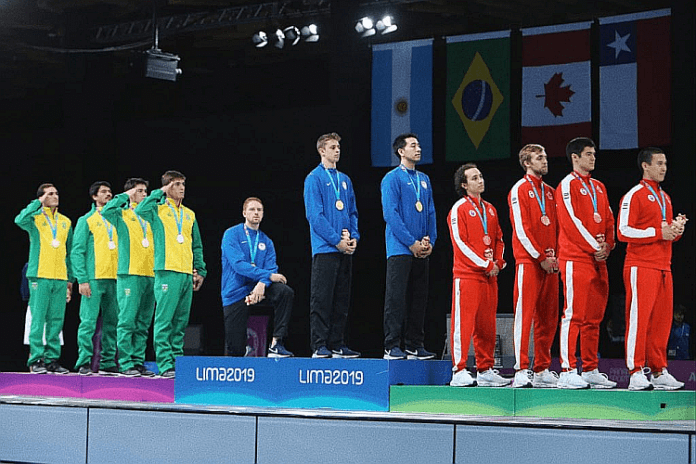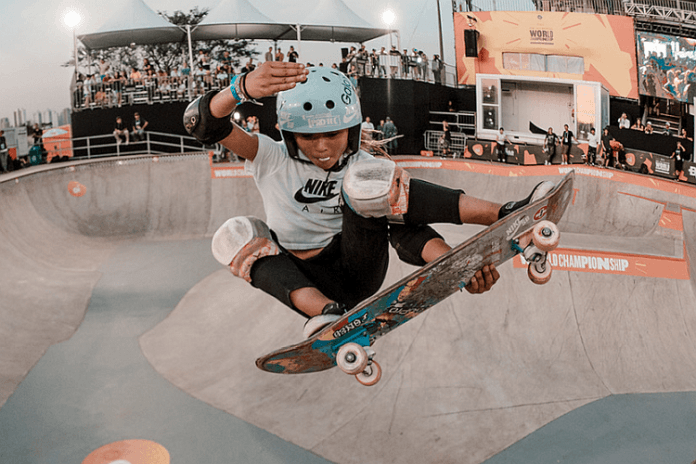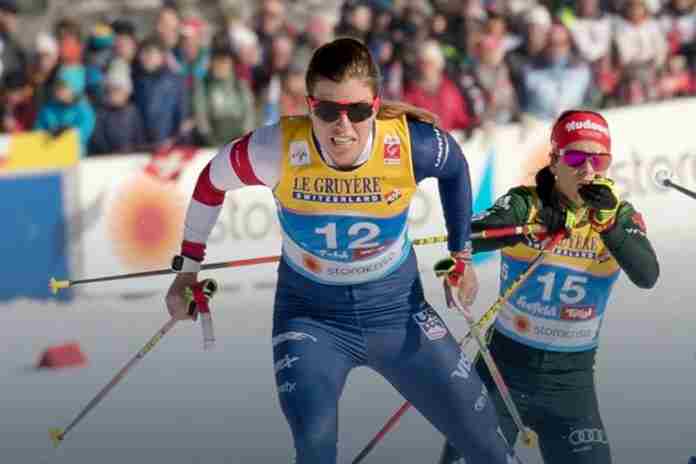(★ Friends: So grateful for new donations received toward the new bills for server and support costs; adding in the overage from the prior request, we’re at 42.5% of our goal. This isn’t the easiest time to ask, but if you would like to help, please donate here. Your enthusiasm is the reason this site continues. ★)
The latest news, notes and quotes from the worldwide Five-Ring Circus:
● U.S. Olympic & Paralympic Committee: The long-awaited U.S. response to the International Olympic Committee’s call for recommendations on “athlete expressions” at the Olympic Games came on Thursday, with a posting from its Team USA Council on Racial and Social Justice, specifically its Steering Committee on Protests and Demonstrations.
The four-page document offered seven recommendations concerning Rule 50 of the Olympic Charter concerning protests, including:
● “Clearly distinguish between human rights/social justice protests and instances of hate speech, racist propaganda, and discriminatory remarks aimed at eliminating the rights and dignity of historically marginalized and minoritized populations. The latter three items should be clearly framed as ‘divisive disruptions.’”
● “Establish a no-punishment-policy for protests and demonstrations that are aimed at promoting human rights/social justice initiatives and advancing the human rights mission of the Olympic and Paralympic movements.”
It also asked for a new, “independent regulatory body” to review and determine consequences for “devise disruptions” in a format similar to institutions such as the Court of Arbitration for Sport and the Independent Testing Agency, both created by the IOC.
The USOPC is supporting this stance:
“In support of this recommendation, the USOPC will not sanction Team USA athletes for respectfully demonstrating in support of racial and social justice for all human beings. This decision addresses the responsibility the USOPC has in the application of IOC and IPC rules prohibiting demonstrations at the Olympic and Paralympic Games.”
The recommendations also asked for similar policies to be adopted at the U.S. National Governing Body level, including a request “When athletes participate in ‘divisive disruptions’ (as outlined in this document), assign penalties to individual athletes rather than an entire team or delegation.”
The latter can – and will be – adopted formally by the USOPC and the NGBs; the recommendations to the IOC will be forwarded to the IOC Athletes’ Commission, which is charged with surveying athlete sentiment from all 206 National Olympic Committees and then recommending any changes to Rule 50 to the IOC Executive Board in the first quarter of 2021.
Analysis:
The recommendations paper was a very carefully developed and precisely-written document, clearly created with a view to ask for “free expression” while at the same time recognizing that not all speech is welcome in terms of content, notably those considered “divisive.”
Moreover – and this is important – the recommendations never mention any specific venue for protests and demonstrations. There is no mention of the awards podium, no mention of the Opening or Closing Ceremonies, or of “free speech” zones in the Olympic Village. Those words never appear in the document. The recommendations ask only for no penalties for actions “aimed at promoting human rights/social justice initiatives and advancing the human rights mission of the Olympic and Paralympic movements.”
This is intentional. With some loud exceptions – and they are loud because they appear to be in the minority – most of the commentary from National Olympic Committee athlete groups about Rule 50 has been to keep protests away from the award ceremonies and the Opening and Closing Ceremonies. More space for speech in the Olympic Village, yes, and possibly in other areas. A moment of silence in one of the ceremonies? A patch or pin to be worn by all athletes at the Games? These are possible.
IOC chief Thomas Bach (GER) has quietly signaled that a continued preference for no protests on the podium is the likely outcome of the Rule 50 consultations. And the cleverly-crafted recommendations in the Council on Racial and Social Justice document can be squared with this. In fact, you can easily create a scenario in which a “peaceful protest” – like a raised fist – could be considered beyond the boundaries of what the recommendations request. Interesting; so do these recommendations go far enough to protect Gwen Berry’s raised fist or Race Imboden taking a knee during their victory ceremonies at the 2019 Pan American Games? Maybe; maybe not.
The way in which the recommendations were developed was also unique. The USOPC did not publicly poll its athletes – as other NOCs such as Australia, Germany and Ireland did – and given the coronavirus pandemic, could not create a meeting to hash out a position. Instead, it formed a 44-member Team USA Council on Racial and Social Justice, with four “Steering Committees,” including the first group activated on Protests and Demonstrations. The members:
● Athlete: Race Imboden, fencing
● Athlete: Grace Latz, rowing
● Athlete: Colleen Quigley, track and field
● Athlete: Noah White, track and field
● NGB: Kelsey Erickson, USA Cycling
● Alumni: John Carlos, 1968 Olympic bronze medalist
● USOPC: Guiselle Torres, Associate General Counsel
The recommendations state clearly:
“This statement with recommendations is the product of data gathered from [Racial and Social Justice] Council meetings, invited guests, a survey, and internal and external experts.” The specifics of the survey were not listed.
Long-time observers of the Olympic Games will note the impressive language supporting “the rights and dignity of historically marginalized and minoritized populations,” citing Olympic icons such as Carlos, Tommie Smith and Wyomia Tyus from the 1968 Olympic track & field team, Jesse Owens from 1936 and Wilma Rudolph from 1960. But no mention is made of the equally controversial – but barely remembered – on-the-podium protest by gold and silver medalists Vince Matthews and Wayne Collett from the 400 m at the 1972 Games in Munch, or for that matter, the anti-Semitic exclusion of Jewish sprinters Marty Glickman and Sam Stoller from the American 4×100 m relay team in 1936.
Sadly, they have been marginalized again.
In a World Athletics post celebrating their selection for the 2020 President’s Award, Smith and Carlos offered clear counsel to those considering their own protest for Tokyo:
● “Smith believes athletes should tread carefully, but have courage in their own convictions.
“‘Follow their own mind,’ he said. ‘Don’t be confused with doing things someone is telling them to do. They have to plan purposefully (and) please proceed with caution. But proceeding has to be pursued with persistence, and there has to be a purpose. You will be responsible for what you put in front of your lips.’”
● “‘I would say you have to check into your emotions, what you believe in,’ said Carlos. ‘If you have a passion for human rights and you want to make a stance, make sure you do your homework and have a clear understanding of why you are making the stance – what you anticipate in terms of bringing to society. And be prepared for any challenges or questions that come to you thereafter.’”
● Athletics ● World Athletics announced that the World Indoor Championships scheduled for Nanjing (CHN) in 2021 has been transferred to 2023 in view of the uncertainty of holding the event next March.
Nanjing was supposed to hold the 2020 World Indoors, but the coronavirus pandemic pushed it back to 2021 and now 2023. The 2022 World Indoor Championships are expected to be held in Belgrade, Serbia. It will only the second time that the World Indoors has been held in consecutive years, previously in 2003 (Birmingham, Great Britain) and 2004 Budapest, Hungary).
● Boxing ● The long-dysfunctional International Boxing Association (AIBA) is scheduled to elect a new President and undertake further reforms this weekend (12-13) in an online Congress, with the elections already troubled by charges and countercharges against the candidates.
The AIBA Election Commission had to send a letter to all of the national boxing federations today (11th), warning against “false documents … distributed by an anonymous sender” that included allegations against Russian Boxing Federation Secretary General Umar Kremlev, one of the candidates. “This disinformation behavior needs to be stopped.”
An online smear campaign was previously noted against candidate Anas Al Otaiba (UAE), head of the Asian Boxing Confederation and a member of the AIBA Executive Committee.
On Thursday, USA Boxing announced its support for Al Otaiba, and published the responses to its very interesting questionnaire sent to all seven original candidates. Four replied and agreed to have their response posted: Al Otaiba, Boris van der Vorst (NED), Ramie Al-Masri (GER, who has since withdrawn) and Suleyman Mikayilov (UZB); Kremlev, interim AIBA chief Mohamed Moustahsane (MAR) and the since-withdrawn Domingo Solano (DOM) did not.
All pledged to reform the AIBA governance issues, straighten out the $16 million-plus debt of the federation and, most importantly, to work with the IOC to regain its status as the international federation for boxing.
On the question of financial solvency, Kremlev promised to eradicate the debt within 100 days but with no details. Mikayilov has the most concrete solution, declaring that (1) AIBA has declared the CHF 19 million debt to Hong Kong investor FCIT in the defunct World Series of Boxing and the similarly-dead Boxing Marketing Arm as simply a failed investment and not requiring repayment and (2) that he has negotiated a waiver of the CHF 10 million debt with Azeri-based Benkons in the World Series of Boxing, contingent on his election and (3) the promise of a CHF 3 million per year sponsorship by Nobel Oil Co. for two years, with more to come. How is this possible? According to his Wikipedia (Azerbaijan) entry, Mikayilov, 58, is essentially the governor of the energy-rich Garadagh region in eastern Azerbaijan. The Wikipedia entry also includes: “He was connected with Gafur Rahimov (a member of the ‘Brothers’ Circle’ criminal group) and also with Azerbaijani criminal groups, including ‘Lankaran’ (Lankaran).” Rahimov – an Uzbek – was appointed as Interim AIBA President and elected as President in 2018, despite being listed by the U.S. Treasury Department as involved in international drug trafficking.
Van der Vorst replied to USA Boxing that “I believe in the immense business and commercial potential of our sport. With improved sport integrity and professional management, AIBA major events can generate enough revenue to clear all debt in four World Championships.”
It’s worth noting that four of the five candidates – Moustahsane, Kremlev, Al Otaiba and Mikayilov – are members of the AIBA Executive Committee, many of long standing as the federation has imploded.. Only van der Vorst is not.
IOC chief Bach noted in his news conference earlier this week:
“AIBA is well aware of the [IOC’s] concerns. There has also been a conversation between our Ethics and Compliance Officer and the relevant body within AIBA. They know the report of the Working Group which has been presented by Mr. [Nenad] Lalovic [SRB] already some time ago. They know about the number of decisions or resolutions we had to pass in the IOC Executive Board.”
It is certainly possible that if anyone other than van der Vorst is elected, that the IOC could claim that AIBA has not fulfilled their request to commit to a new start in governance by electing an existing Executive Committee member, already at least partially responsible for the fix that the federation is in now. Stay tuned.
● Football ● The U.S. Men’s National Team crushed a depleted El Salvador squad by 6-0 in Miami on 9 December (Wednesday), sparked by striker Chris Mueller, playing in his first game for his country.
Mueller set up the first goal, by Paul Arriola, in the 17th minute with a cross from the left of goal, then scored himself in the 20th and 25th minutes. Sebastian Lleget scored in the 23rd minute and then Mueller assisted on a 27th-minute goal by Ayo Akinola – also making his U.S. debut – for a 5-0 halftime lead.
Brenden Aaronson scored in the 50th minute for the only second-half goal. The U.S. out-shot El Salvador by 22-3.
This was the final game of the year for the U.S. men, who will have a busy 2021, especially focused on qualifying for the Tokyo Olympic Games, a competition the U.S. missed in 2016.
¶
Swiss Special Prosecutor Stefan Keller has asked the Swiss authorities to look into the use of a private plane by FIFA President Gianni Infantino (SUI) in 2017 on a flight from Surinam to Geneva, Switzerland.
Keller’s referral indicated “clear signs of criminally reprehensible behaviour.” FIFA responded furiously on Friday (11th), stating
“FIFA and the FIFA President are shocked by the statement issued today by “special prosecutor” Stefan Keller. This statement is both malicious and defamatory in nature and demonstrates his extreme bias. …
“FIFA and its President will obviously take all necessary legal steps and remedies to put an end to these baseless and ill-intentioned accusations.”
¶
CONCACAF announced the qualification procedure for the 2023 FIFA Women’s World Cup, with a group stage of 30 teams to compete for six places – one each for six group winners – in a final tournament in July 2022. These matches will be held from November 2021 to April 2022.
The final qualifier will be an eight-team program, with the U.S. and Canada joining the six qualifier. Two groups of four will play a round-robin schedule and the top two in each group would qualify into the semifinals.
A new CONCACAF Women’s Nations League was also announced for 2023-24, with national teams split into three leagues. A 12-team finals will be held in June 2024, with eight CONCACAF teams and four guest teams, leading to an eight-team elimination tournament.
This is a major step forward for women’s national teams in the region, designed to heighten the profile of women’s football and encourage more investment. It may not, however, help the U.S. since the teams in the region are significantly weaker competition – at present – than the American women usually face.
● Gymnastics ● Although with a lower profile than the USOPC announcement on protests, USA Gymnastics released on Thursday (10th) its “Athlete Bill of Rights.”
The eight-point list emphasizes that anyone should have the right to participate, safely, with their “personal health and wellness prioritized,” and receive “proper instruction,” and be able to voice their concerns without penalty.
The announcement noted “The Athlete Bill of Rights was a collaborative effort between USA Gymnastics and members of the organization’s elected Athletes’ Council, which serves as a conduit between USA Gymnastics and athletes within the sport.”
On protests, the Athlete Bill of Rights states:
“Athletes have the right to respectfully express themselves on issues that impact the gymnastics community, with the confidence that doing so will not jeopardize their ability to participate and/or negatively impact their success.”
For the elite, the announcement further explained:
“The policy, as stated in the National Team handbook, reads: ‘In a number of forums (e.g., on social media, at press conferences, etc.), you also have a platform to use your voice in other ways – whether that is to inspire the next generation of gymnasts, provide feedback on your experiences, share personal anecdotes, or advocate for causes you believe in. Your choice to do so – including through peaceful protest at a USA Gymnastics’ event – will not impact selections, team participation, or results, to the extent it is under USA Gymnastics’ control (i.e., the Olympic Games are not under USAG’s control), so long as you are complying with the USA Gymnastics’ policies, including the Code of Ethical Conduct.’”
● Swimming ● Caeleb Dressel’s time-trial attempts to break the 20-second barrier in a banned Speedo LZR Racer suit came up short on two tries on Thursday (10th).
Swimming in a 25 m (short course) pool at the La Mirada Regional Aquatics Center in La Mirada, California, Dressel swam 20.41 and 20.42, short of the goal, but also of his record 20.16 swim in the ISL Grand Final in Budapest (HUN) last month.
The attempt was sponsored by Speedo to mark the 20th anniversary of its Fastskin suit series. Said Dressel afterwards, “I had to change a couple of things like my body position. It felt really, really good – but I’ll say this; nothing is guaranteed and the suit doesn’t make the swimmer, the swimmer makes the suit.”
● Weightlifting ● The war of words within weightlifting continued this week in the aftermath of the huge reduction in athletes who will compete in the 2024 Paris Games. From a total of 260 competitors in Rio in 2016, the sport was cut to 196 for Tokyo and now just 120 for Paris.
The International Weightlifting Federation’s statement, uncredited, but ostensibly from Interim President Dr. Michael Irani (GBR) included:
“Clean weightlifters continue to pay a woefully heavy price for inadequate governance and for those — from a relatively limited number of countries — who tried to take shortcuts to success at London 2012 and Beijing 2008. …
“I believe we can meet the IOC’s criteria for remaining on the Paris 2024 Olympic programme and even reach the point where we restore Olympic weightlifting opportunities for a new generation of clean weightlifters. We have already embarked on a journey towards radical governance reform. But we must be under no illusion about the scope and scale of change required.”
That was not the view of British Weightlifting, whose statement included:
“While the IWF Executive Board may feel it has already embarked on a journey towards governance reform, this is a clear message from the IOC that they don’t trust those current Board members to deliver in designated timescales meaningful and appropriate change, including a clean sporting landscape, the successful implementation of athlete representation, a new constitution and the need for a clear and transparent methods of election.
“BWL believes it is time for immediate change and we reiterate our earlier call for the Executive Board to stand down. They have been there too long and have been involved in too much controversy and should resign with immediate effect allowing a group of new, ethically eligible individuals who can work closely with key stakeholders to rebuild the sport and allow the athletes an opportunity to achieve their ultimate sporting ambitions.
“The future of the sport remains massively uncertain.”
● Wrestling ● While the 2020 World Championships were canceled due to the coronavirus pandemic, a substitute “Individual World Cup” has drawn 505 wrestlers from 51 countries to Belgrade, Serbia for competition from 12-18 December.
All 30 weight class in men’s Freestyle, women’s Freestyle and men’s Greco-Roman will be contested, with prize money of CHF 10,000 per class (CHF 300,000 total). The U.S. is not competing.
● The Last Word ● The head of the Russian Olympic Committee, Stanislav Pozdnyakov, said on Thursday that the U.S.’s “Rodchenkov Anti-Doping Act of 2019″ is hypocritical:
“The ROC has thoroughly studied the new law, which came into power in the United States. We believe that such approach of the United States is totally unacceptable.
“One should take care of the anti-doping issue in line with international standards at the national level before assuming monitoring duties in sports [internationally]. The U.S. professional leagues are not participating in the international anti-doping coalition and they are all legally exempt from the WADA Code. Foreign anti-doping officers cannot execute their duties [in the United States].
“We [ROC] see a policy of double standards in the US approach to this problem.”
Pozdnyakov did not note that the doping controls in Major League Baseball, the NFL, NBA, NHL and others is the result of collective bargaining between the leagues and the players. But he also – most importantly – did not say that the ROC would push for a parallel law in Russia, with overseas enforcement powers. Such retaliatory laws are a great fear for the World Anti-Doping Agency, with Russia one of the obvious candidates to enact such a statute. But not yet.
You can receive our exclusive TSX Report by e-mail by clicking here. You can also refer a friend by clicking here, and can donate here to keep this site going.
For our 526-event International Sports Calendar from October 2020 to June 2021, by date and by sport, click here!





















